Пассивный залог в английском языке

Если подлежащее обозначает лицо или предмет, совершающий действие, то глагол-сказуемое употребляется в форме активного залога (Active voice). Другими словами, нам известно, кто выполняет действие:
- Он (кто?) помог (что сделал?) мне.
- Рабочие (кто?) ремонтируют мост.
Если подлежащее обозначает лицо или предмет, подвергающийся действию со стороны другого лица или предмета, то глагол-сказуемое употребляется в форме пассивного (страдательного) залога (Passive voice). Т.е., по каким-то причинам лицо, выполняющие действие, опускается:
- Мне помогли (кто? – не известно).
- Мост ремонтируют.


Не боимся бросить вызов теме? Сейчас проверим!
Exercise 1. Раскройте скобки, употребляя глаголы в Present Simple Passive. (USUALLY)
- The postbox (to empty) every day.
- The stamps (to postmark) at the post office.
- The letters (to sort) into the different towns.
- The mail (to load) into the train.
- The mailbags (to unload) after their journey.
- The bags (to take) to the post office.
- The letters (to sort) into the different streets.
- The letters (to deliver).
Answers:


Exercise 2. Раскройте скобки, употребляя глаголы в Past Simple Passive. (YESTERDAY)
- The postbox (to empty) yesterday.
- The stamps (to postmark) at the post office.
- The letters (to sort) into the different towns.
- The mail (to load) into the train.
- The bags (to take) to the post office.
- The letters (to sort) into the different streets.
- The letters (to deliver).
Answers: 1. was emptied. 2. were postmarked. 3. were sorted. 4. was loaded. 5. were unloaded. 6. were taken. 7. were sorted. 8. were delivered.
Exercise 3. Раскройте скобки, употребляя глаголы в Future Simple Passive. (TOMORROW)
- The postbox (to empty) tomorrow.
- The stamps (to postmark) at the post office.
- The letters (to sort) into the different towns.
- The mail (to load)
- The mailbags (to unload) after their journey.
- The bags (to take) to the post office.
- The letters (to sort) into the different streets.
- The letters (to deliver).
Answers: 1. will be emptied. 2. will be postmarked. 3. will be sorted. 4. will be loaded. 5. will be unloaded. 6. will be taken. 7. will be sorted. 8. will be delivered.
Exercise 4. Раскройте скобки, употребляя глаголы в Present, Past или Future Simple Passive.
- My question (to answer) yesterday.
- Hockey (to play) in winter.
- Mushrooms (to gather) in autumn.
- Many houses
- His new book (to finish) next year.
- Flowers (to sell) in shops and in the streets.
- St. Petersburg (to found) in 1703.
- Bread (to eat) every day.
- The letter (to receive) yesterday.
- Nick (to send) to Moscow next week.
- I (to ask) at the lesson yesterday.
- I (to give) a very interest ing book at the library last Friday.
- Many houses (to build) in our town every year.
- This work (to do) tomorrow.
- This text (to translate)
- These trees (to plant) last autumn.
- Many interesting games always (to play) at our PT lessons.
- This bone (to give) to my dog tomorrow.
- We (to invite) to a concert last Saturday.
- Lost time never (to find) again.
- Rome (not to build) in a day.
Answers: 1. was answered. 2. is played. 3. are gathered. 4. were burnt. 5. will be finished. 6. are sold. 7. was founded. 8. is eaten. 9. was received. 10. will be sent. 11. was asked. 12. was given. 13. are built. 14. will be done. 15. was translated. 16. were planted. 17. are always played. 18. will be given. 19. were invited. 20. is never found. 21. was not built.


Exercise 5. Раскройте скобки, выбирая требующуюся форму глагола.
- At the station they will (meet, be met) by a man from the travel bureau.
- She will (meet, be met) them in the hall upstairs.
- The porter will (bring, be brought) your luggage to your room.
- Your luggage will (bring, be brought) up in the lift.
- They can (leave, be left) the key with the clerk downstairs.
- From the station they will (take, be taken) straight to the hotel.
- Tomorrow he will (take, be taken) them to the Russian Museum.
Answers: 1. will be met. 2. will meet. 3. will bring. 4. will be brought. 5. may leave. 6. can leave. 7. will be taken. 8. will take.
Exercise 6. Передайте следующие предложения в Passive Voice, обращая внимание на место предлога.
• E.g. We often speak of her. — She is often spoken of.
- The senior students laughed at the freshman.
- The group spoke to the headmistress yesterday.
- Young mothers looked after their babies with great care.
- Nobody lived in that old house.
- They sent for Jim and told him to prepare a report on that subject.
- We thought about our friend all the time.
- The doctor will operate on him in a week.
- The teacher sent for the pupil’s parents.
- They looked for the newspaper everywhere.
- Nobody slept in the bed.
- The neighbour asked for the telegram.
- Everybody listened to the lecturer with great attention.
Answers: 1. The freshman was laughed at. 2. The headmistress was spoken to yesterday. 3. The babies were looked after with great care. 4. That old house was not lived in. 5. Jim was sent for and told to prepare a report on that subject. 6. Our friend was thought about all the time. 7. He will be operated on in a week. 8. The pupil’s parents were sent for. 9. The newspaper was looked for everywhere. 10. The bed was not slept in. 11. The telegram was asked for. 12. The lecturer was listened to with great attention.
Exercise 7. Раскройте скобки, употребляя глаголы в Active Voice или Passive Voice.
- Nobody (to see) him yesterday.
- The telegram (to receive) tomorrow.
- He (to give) me this book next week.
- The answer to this question can (to find) in the encyclopedia.
- We
- You can (to find) interesting information about the life in the USA in this book.
- Budapest (to divide) by the Danube into two parts: Buda and Pest.
- Yuri Dolgoruki (to found) Moscow in 1147.
- Moscow University (to found) by Lomonosov.
- We (to call) Zhukovski the father of Russian aviation.
Answers: 1. saw. 2. will be received. 3. will give. 4. be found. 5. shall show. 6. find. 7. is divided. 8. founded. 9. was founded. 10. call.


Exercise 8. Передайте следующие предложения в Passive Voice.
- Не stole a lot of money from the shop.
- By six o’clock they had finished the work.
- At twelve o’clock the workers were loading the trucks.
- By three o’clock the workers had loaded the trucks.
- We send our daughter to rest in the south every year.
- They will show this film on TV.
- They are building a new concert hall in our street.
- I bought potatoes yesterday.
- We shall bring the books tomorrow.
- They are repairing the clock now.
- They sell milk in this shop.
- I have translated the whole text.
- They broke the window last week.
- When I came home, they had eaten the sweets.
- We shall do the work in the evening.
- He wrote this book in the 19th century.
- They were playing tennis from four till five.
- They have made a number of important experiments in this laboratory.
- Livingstone explored Central Africa in the 19th century.
- By the middle of autumn we had planted all the trees.
- They will stage this play at the beginning of next season.
- They have forgotten the story.
- Has anybody explained the rules of the game to you?
- They haven’t brought back my skates.
Answers:1. A lot of money was stolen from the shop. 2. By six o’clock the work had been finished. 3. At twelve o’clock the trucks were being loaded. 4. By three o’clock the trucks had been loaded. 5. Our daughter is sent to rest in the south every year. 6. This film will be shown on TV. 7. A new concert hall is being built in our street. 8. Potatoes were bought yesterday. 9. The books will be brought tomorrow. 10. The clock is being repaired now. 11. Milk is sold in this shop. 12. The whole text has been translated.. 13. The window was broken last week. 14. When I came home, the sweets had been eaten. 15. The work will be done in the evening. 16. This book was written in the 19th century. 17. Tennis was being played.from four till five. 18. The number of important experiments K-we been made in this laboratory. 19. Central Africa was explored by Livingstone in the 19th century. 20. By the middle of autumn all the trees had been planted. 21. This play will be staged at the beginning of next season. 22. The story has been forgotten. 23. Have the rules of the game been explained to you? 24. My skates haven’t been brought back.
Exercise 9. Передайте следующие предложения в Active Voice. Введите любые подходящие подлежащие.
- The room was cleaned and aired.
- Have all these books been read?
- Whom were these letters written by?
- The letter has just been typed.
- She showed me the picture which had been painted by her husband.
- I shall not be allowed to go there.
- He has been told everything, so he knows what to do now.
- All the questions must be answered.
- The door has been left open.
- Betty was met at the station.
- The girl was not allowed to go to the concert.
- She said that the new timetable had not yet been hung up on the notice board.
- The roast chicken was eaten with appetite.
- It was so dark, that the houses could not be seen.
- The light has not yet been turned off.
- The boy was punished for misbehaving.
- By three o’clock everything had been prepared.
- The dictation was written without mistakes.
- Whom was the poem written by?
- Her dress was washed and ironed.
- I was not blamed for the mistakes.
- The papers had been looked through and corrected by the next lesson.
- This house was built last year.
- The letter has just been sent.
- This article will be translated at the lesson on Tuesday.
- When will this book be returned to the library?
Answers:I. She cleaned and aired the room. 2. Have you read all these books? 3. Who wrote these letters? 4.The secretary has just typed the letter. 5. She showed me the picture which her husband had painted. 6. My parents will not allow me to go there. 7. We have told him everything so he knows what to do. 8. You must answer all the questions. 9. They have left the door open. 10. We met Betty at the station.
II. The girl’s mother did not allow her to go to the concert. 12. She said that they had not yet hung up the new timetable on the notice board. 13. We ate the chicken with appetite. 14. It was so dark that we could not see the houses. 15. They have not yet turned off the light. 16. She punished the boy for misbehaving. 17. By three o’clock we had prepared everything. 18. We wrote the dictation without mistakes. 19. Who wrote the poem? 20. She washed and ironed her dress. 21. They did not blame me for the mistakes. 22. The teacher had looked through and corrected the papers by the next lesson. 23.They built this house last year. 24. We have just sent the letter. 25. We shall translate this article at the lesson on Tuesday. 26. When will you return this book to the library?


Exercise 10. Переведите на английский язык, употребляя глаголы в Passive Voice.
- Нам показали очень странную картину.
- Тебя ищут. Иди домой.
- Вас всех пригласят в зал и расскажут обо всех изменениях в школьной программе.
- Почему над ним всегда смеются?
- Нам всем дали билеты на выставку.
- Лекции этого знаменитого профессора всегда слушают с большим вниманием.
- Меня ждут?
- Им задали три трудных вопроса.
- За директором уже послали. Подождите немного.
- Всех пригласили в большой зал.
- Эти письма просмотрены. Их можно отправлять.
- На станции их встретил гид и отвез в гостиницу.
- Эти журналы должны быть возвращены в библиотеку на следующей неделе.
- На наших занятиях много внимания уделяется произношению.
- Иванову велели объяснить, почему он пропускает занятия.
- Меня пригласят на ваш вечер?
- Детей оставили дома одних.
Answers: 1. We were shown a very strange picture. 2. You are being looked for. Go home. 3. All of you will be gathered in the hall and told about all the changes in the school curriculum. 4. Why is he always laughed at? 5. All of us were given tickets to the exhibition. 6. The lectures of this famous professor are always listened to with great attention. 7. Am I being waited for? 8. They were asked three difficult questions. 9. The headmaster has already been sent for. Please wait a little. 10. Everybody was invited to a big hall. 11. These letters have been looked through. They can be sent. 12. At the station they were met by the guide and taken to the hotel. 13. These magazines must be returned to the library next week. 14. At our lessons much attention is paid to pronunciation. 15. Ivanov was told to explain why he missed classes. 16. Shall I be invited to your party? 17. The children were left alone at home.
WELL DONE!


Литература:
- Павличенко О.М. Английский язык. Грамматический практикум. II уровень. — 2-е изд., испр. и доп. — X.: Ранок, 2012. — 304 с.
- Голицынский Ю.Б. Грамматика: Сборник упражнений. — 5-е изд., — СПб: КАРО, 2005. — 544 с. — (Английский язык для школьников).
Активный и пассивный залог в английском языке
Passive voice — упражнения с ответами на страдательный залог
Функции пассивного залога
Пассивный залог используется для выражения интереса к человеку или объекту, которые испытывают на себе действие, нежели к действию, которое производят этот человеком или объект. Другими словами, предмет интереса или интересующий нас человек становятся подлежащими предложения.
ПРИМЕРЫ
- The passive voice is used frequently. (= нам интересен пассивный залог, а не тот, кто его использует.)
- The house was built in 1654. (= мы заинтересованы в самом доме, а не в том, кто его построил.)
- The road is being repaired. (= нас интересует дорога, а не те, кто её ремонтируют.)
Отметим! Иногда мы используем пассивный залог, потому что не знаем, или нам не важно, кто совершил действие.
ПРИМЕРЫ
- I noticed that a window had been left open.
- Every year thousands of people are killed on our roads.
- All the cookies have been eaten.
- My car has been stolen!
Пассивный залог часто используется в официальных текстах. Изменение пассивного залога на активный сразу сделает вашу речь понятной и более доступной на письме.
| Пассивный залог | Активный залог |
|---|---|
| A great deal of meaning is conveyed by a few well-chosen words. | A few well-chosen words convey a great deal of meaning. |
| Our planet is wrapped in a mass of gases. | A mass of gases wrap around our planet. |
| Waste materials are disposed of in a variety of ways. | The city disposes of waste materials in a variety of ways. |
Если мы хотим сказать, что действие совершается кем-то или чем-то, и использовать при этом пассивный залог, мы добавляем предлог by. Когда мы знаем, кто произвёл действие и заинтересованы в этом человеке, всегда лучше использовать активный залог вместо пассивного.
| Пассивный залог | Активный залог |
|---|---|
| «A Hard Day’s Night» was written by the Beatles. | The Beatles wrote «A Hard Day’s Night». |
| The movie ET was directed by Spielberg. | Spielberg directed the movie ET. |
| This house was built by my father. | My father built this house. |
Упражнения с ответами
Exercise 1. Раскройте скобки, употребляя глаголы в Present Simple Passive. (USUALLY)
- The postbox (to empty) every day.
- The stamps (to postmark) at the post office.
- The letters (to sort) into the different towns.
- The mail (to load) into the train.
- The mailbags (to unload) after their journey.
- The bags (to take) to the post office.
- The letters (to sort) into the different streets.
- The letters (to deliver).
Посмотреть ответы:
| 1. is emptied 2. are postmarked. 3. are sorted. 4. is loaded. | 5. are unloaded. 6. are taken. 7. are sorted. 8. are delivered. |
Exercise 2. Раскройте скобки, употребляя глаголы в Past Simple Passive. (YESTERDAY)
- The postbox (to empty) yesterday.
- The stamps (to postmark) at the post office.
- The letters (to sort) into the different towns.
- The mail (to load) into the train.
- The mailbags (to unload) after their journey.
- The bags (to take) to the post office.
- The letters (to sort) into the different streets.
- The letters (to deliver).
Посмотреть ответы:
| 1. was emptied. 2. were postmarked. 3. were sorted. 4. was loaded. | 5. were unloaded. 6. were taken. 7. were sorted. 8. were delivered |
Exercise 3. Раскройте скобки, употребляя глаголы в Future Simple Passive. (TOMORROW)
- The postbox (to empty) tomorrow.
- The stamps (to postmark) at the post office.
- The letters (to sort) into the different towns.
- The mail (to load) into the train.
- The mailbags (to unload) after their journey.
- The bags (to take) to the postoffice.
- The letters (to sort) into the different streets.
- The letters (to deliever).
Посмотреть ответы:
| 1. will be emptied. 2. will be postmarked. 3. will be sorted. 4. will be loaded. | 5. will be unloaded. 6. will be taken. 7. will be sorted. 8. will be delivered. |
Exercise 4. Раскройте скобки, употребляя глаголы в Present, Past или Future Simple Passive.
- My question (to answer) yesterday.
- Hockey (to play) in winter.
- Mushrooms (to gather) in autumn.
- Many houses (to burn) during the Great Fire of London.
- His new book (to finish) next year.
- Flowers (to sell) in shops and in the streets.
- St. Petersburg (to found) in 1703.
- Bread (to eat) every day.
- The letter (to receive) yesterday.
- Nick (to send) to Moscow next week.
- I (to ask) at the lesson yesterday.
- I (to give) a very interest ing book at the library last Friday.
- Many houses (to build) in our town every year.
- This work (to do) tomorrow.
- This text (to translate) at the last lesson.
- These trees (to plant) last autumn.
- Many interesting games always (to play) at our PT lessons.
- This bone (to give) to my dog tomorrow.
- We (to invite) to a concert last Saturday.
- Lost time never (to find) again.
- Rome (not to build) in a day.
Посмотреть ответы:
| 1. was answered. 2. is played. 3. are gathered. 4. were burnt. 5. will be finished. 6. are sold. 7. was founded. 8. is eaten. 9. was received. 10. will be sent. 11. was asked. | 12. was given. 13. are built. 14. will be done. 15. was translated. 16. were planted. 17. are always played. 18. will be given. 19. were invited. 20. is never found. 21. was not built. |
Exercise 5. Раскройте скобки, выбирая требующуюся форму глагола.
- At the station they will (meet, be met) by a man from the travel bureau.
- She will (meet, be met) them in the hall upstairs.
- The porter will (bring, be brought) your luggage to your room.
- Your luggage will (bring, be brought) up in the lift.
- You may (leave, be left) your hat and coat in the cloakroom downstairs.
- They can (leave, be left) the key with the clerk downstairs.
- From the station they will (take, be taken) straight to the hotel.
- Tomorrow he will (take, be taken) them to the Russian Museum.
Посмотреть ответы:
| 1. will be met. 2. will meet. 3. will bring. 4. will be brought. | 5. may leave. 6. can leave. 7. will be taken. 8. will take. |
Exercise 6. Передайте следующие предложения в Passive Voice, обращая внимание на место предлога.
E.g. We often speak of her. — She is often spoken of.
- The senior students laughed at the freshman.
- The group spoke to the headmistress yesterday.
- Young mothers looked after their babies with great care.
- Nobody lived in that old house.
- They sent for Jim and told him to prepare a report on that subject.
- We thought about our friend all the time.
- The doctor will operate on him in a week.
- The teacher sent for the pupil’s parents.
- They looked for the newspaper everywhere.
- Nobody slept in the bed.
- The neighbour asked for the telegram.
- Everybody listened to the lecturer with great attention.
Посмотреть ответы:
| 1. The freshman was laughed at. 2. The headmistress was spoken to yesterday. 3. The babies were looked after with great care. 4. That old house was not lived in. 5. Jim was sent for and told to prepare a report on that subject. 6. Our friend was thought about all the time. | 7. He will be operated on in a week. 8. The pupil’s parents were sent for. 9. The newspaper was looked for everywhere. 10. The bed was not slept in. 11. The telegram was asked for. 12. The lecturer was listened to with great attention. |
Exercise 7. Раскройте скобки, употребляя глаголы в Active Voice или Passive Voice.
- Nobody (to see) him yesterday.
- The telegram (to receive) tomorrow.
- He (to give) me this book next week.
- The answer to this question can (to find) in the encyclopedia.
- We (to show) the historical monuments of the capital to the delegation tomorrow.
- You can (to find) interesting information about the life in the USA in this book.
- Budapest (to divide) by the Danube into two parts: Buda and Pest.
- Yuri Dolgoruki (to found) Moscow in 1147.
- Moscow University (to found) by Lomonosov.
- We (to call) Zhukovski the father of Russian aviation.
Посмотреть ответы:
| 1. saw. 2. will be received. 3. will give. 4. be found. 5. shall show. | 6. find. 7. is divided. 8. founded. 9. was founded. 10. call. |
Exercise 8. Передайте следующие предложения в Passive Voice.
- Не stole a lot of money from the shop.
- By six o’clock they had finished the work.
- At twelve o’clock the workers were loading the trucks.
- By three o’clock the workers had loaded the trucks.
- We send our daughter to rest in the south every year.
- They will show this film on TV.
- They are building a new concert hall in our street.
- I bought potatoes yesterday.
- We shall bring the books tomorrow.
- They are repairing the clock now.
- They sell milk in this shop.
- I have translated the whole text.
- They broke the window last week.
- When I came home, they had eaten the sweets.
- We shall do the work in the evening.
- He wrote this book in the 19th century.
- They were playing tennis from four till five.
- They have made a number of important experiments in this laboratory.
- Livingstone explored Central Africa in the 19th century.
- By the middle of autumn we had planted all the trees.
- They will stage this play at the beginning of next season.
- They have forgotten the story.
- Has anybody explained the rules of the game to you?
- They haven’t brought back my skates.
Посмотреть ответы:
| 1. A lot of money was stolen from the shop. 2. By six o’clock the work had been finished. 3. At twelve o’clock the trucks were being loaded. 4. By three o’clock the trucks had been loaded. 5. Our daughter is sent to rest in the south every year. 6. This film will be shown on TV. 7. A new concert hall is being built in our street. 8. Potatoes were bought yesterday. 9. The books will be brought tomorrow. 10. The clock is being repaired now. 11. Milk is sold in this shop. 12. The whole text has been translated.. 13. The window was broken last week. | 14. When I came home, the sweets had been eaten. 15. The work will be done in the evening. 16. This book was written in the 19th century. 17. Tennis was being played.from four till five. 18. The number of important experiments K-we been made in this laboratory. 19. Central Africa was explored by Livingstone in the 19th century. 20. By the middle of autumn all the trees had been planted. 21. This play will be staged at the beginning of next season. 22. The story has been forgotten. 23. Have the rules of the game been explained to you? 24. My skates haven’t been brought back. |
Exercise 9. Передайте следующие предложения в Active Voice. Введите любые подходящие подлежащие.
- The room was cleaned and aired.
- Have all these books been read?
- Whom were these letters written by?
- The letter has just been typed.
- She showed me the picture which had been painted by her husband.
- I shall not be allowed to go there.
- He has been told everything, so he knows what to do now.
- All the questions must be answered.
- The door has been left open.
- Betty was met atthe station.
- The girl was not allowed to go to the concert.
- She said that the new timetable had not yet been hung up on the notice board.
- The roast chicken was eaten with appetite.
- It was so dark, that the houses could not be seen.
- The light has not yet been turned off.
- The boy was punished for misbehaving.
- By three o’clock eve rything had been prepared.
- The dictation was written without mistakes.
- Whom was the poem written by?
- Her dress was washed and ironed.
- I was not blamed for the mistakes.
- The papers had been looked through and corrected by the next lesson.
- This house was built last year.
- The letter has just been sent.
- This article will be translated at the lesson on Tuesday.
- When will this book be returned to the library?
Посмотреть ответы:
| 1. She cleaned and aired the room. 2. Have you read all these books? 3. Who wrote these letters? 4.The secretary has just typed the letter. 5. She showed me the picture which her husband had painted. 6. My parents will not allow me to go there. 7. We have told him everything so he knows what to do. 8. You must answer all the questions. 9. They have left the door open. 10. We met Betty at the station. II. The girl’s mother did not allow her to go to the concert. 12. She said that they had not yet hung up the new timetable on the notice board. 13. We ate the chicken with appetite. | 14. It was so dark that we could not see the houses. 15. They have not yet turned off the light. 16. She punished the boy for misbehaving. 17. By three o’clock we had prepared everything. 18. We wrote the dictation without mistakes. 19. Who wrote the poem? 20. She washed and ironed her dress. 21. They did not blame me for the mistakes. 22. The teacher had looked through and corrected the papers by the next lesson. 23.They built this house last year. 24. We have just sent the letter. 25. We shall translate this article at the lesson on Tuesday. 26. When will you return this book to the library? |
Exercise 10. Переведите на английский язык, употребляя глаголы в Passive Voice.
- Нам показали очень странную картину.
- Тебя ищут. Иди домой.
- Вас всех пригласят в зал и расскажут обо всех изменениях в школьной программе.
- Почему над ним всегда смеются?
- Нам всем дали билеты на выставку.
- Лекции этого знаменитого профессора всегда слушают с большим вниманием.
- Меня ждут?
- Им задали три трудных вопроса.
- За директором уже послали. Подождите немного.
- Всех пригласили в большой зал.
- Эти письма просмотрены. Их можно отправлять.
- На станции их встретил гид и отвез в гостиницу.
- Эти журналы должны быть возвращены в библиотеку на следующей неделе.
- На наших занятиях много внимания уделяется произношению.
- Иванову велели объяснить, почему он пропускает занятия.
- Меня пригласят на ваш вечер?
- Детей оставили дома одних.
Посмотреть ответы:
| 1. We were shown a very strange picture. 2. You are being looked for. Go home. 3. All of you will be gathered in the hall and told about all the changes in the school curriculum. 4. Why is he always laughed at? 5. All of us were given tickets to the exhibition. 6. The lectures of this famous professor are always listened to with great attention. 7. Am I being waited for? 8. They were asked three difficult questions. 9. The headmaster has already been sent for. Please wait a little. | 10. Everybody was invited to a big hall. 11. These letters have been looked through. They can be sent. 12. At the station they were met by the guide and taken to the hotel. 13. These magazines must be returned to the library next week. 14. At our lessons much attention is paid to pronunciation. 15. Ivanov was told to explain why he missed classes. 16. Shall I be invited to your party? 17. The children were left alone at home. |
Источник: https://engfairy.com/passivnyj-zalog-uprazhneniya/
Источник: https://www.ef.ru/angliyskie-resursy/angliyskaya-grammatika/passivnyy-zalog/
Читайте также:
Пассивный (страдательный) залог 1 (present и past simple) в английском языке
Изучите этот пример:
This house was built in 1935.
Этот дом был построен в 1935 году.
Was built is passive (пассивный/страдательный залог).
Сравните активный (действительный) и пассивный залоги:

Когда мы используем активный глагол, мы говорим о том, что делает подлежащее (subject):
- My grandfather was a builder. He built this house in 1935. (Он построил…)
- It’s a big company. It employs two hundred people. (Она предоставляет работу…)
Когда мы используем пассивный глагол, мы говорим о том, что происходит с подлежащим:
- This house is quite old. It was built in 1935.
- Two hundred people are employed by the company.
Двести человек трудоустроены в этой компании. (досл.: есть нанятые)
Когда мы используем пассивный залог, мы часто не знаем кто или что совершает действие, либо нам не важно это знать:
- A lot of money was stolen in the robbery. (кто-то украл их, но мы не знаем кто)
- Is this room cleaned every day? (кто-нибудь прибирает комнату? — не важно кто)
Если нам нужно сказать кто или что совершает действие, мы добавляем by … :
- This house was built by my grandfather. (моим дедушкой)
- Two hundred people are employed by the company. (компанией)
Пассивный залог состоит из глагола be (is/was и т.д.) + past participle (причастие прошедшего времени) (done/cleaned/seen и т.д.):
(be) done (be) cleaned (be) damaged (be) built (be) seen etc.
см. Список неправильных глаголов английского языка.
Изучите активные и пассивные формы для present simple и past simple:
Present simple
am/is/are + cleaned/seen etc.

- Many accidents are caused by careless driving.
Много несчастных случаев происходит из-за невнимательности на дорогах. - I’m not often invited to parties.
Меня не часто приглашают на вечеринки. - How is this word pronounced?
Как произносится это слово?
Past simple
was/were + cleaned/seen etc.

- We were woken up by a loud noise during the night.
Нас разбудил громкий шум посреди ночи. - ‘Did you go to the party?’ ‘No, I wasn’t invited.’
Ты ходил на вечеринку? — Нет, меня не пригласили. - How much money was stolen in the robbery?
Сколько денег было украдено во время ограбления?
Упражнения
1. Закончите предложения, используя один из этих глаголов в правильной форме настоящего или прошедшего времени:
| damage | hold | invite | make | |
| overtake | show | surround | translate | write |
- Many accidents by dangerous driving.
- Cheese from milk.
- The roof of the building in a storm a few days ago.
- You to the wedding. Why didn’t you go?
- A cinema is a place where films .
- In the United States, elections for president every four years.
- Originally the book in Spanish, and a few years ago it into English.
- Although we were driving quite fast, we by a lot of other cars.
- You can’t see the house from the road. It by trees.

2. Напишите вопросы, используя пассив настоящего или прошедшего времени.
- Ask about glass. (how/make?)
- Ask about television. (when / invent?)
- Ask about mountains. (how / form?)
- Ask about Pluto (the planet). (when / discover?)
- Ask about silver. (what / use for?)

3. Поставьте глагол в правильную форму: present simple или past simple, active или passive.
- It’s a big factory. Five hundred people (employ) there.
- (somebody / clean) this room yesterday?
- Water (cover) most of the earth’s surface.
- How much of the earth’s surface (cover) by water?
- The park gates (lock) at 6.30 p.m. every evening.
- The letter (post) a week ago and it (arrive) yesterday.
- The boat hit a rock and (sink) quickly. Fortunately everybody (rescue).
- Richard’s parents (die) when he was very young. He and his sister (bring up) by their grandparents.
- I was born in London, but I (grow up) in Canada.
- While I was on holiday, my camera (steal) from my hotel room.
- While I was on holiday, my camera (disappear) from my hotel room.
- Why (Sue / resign) from her job? Didn’t she enjoy it?
- Why (Bill / sack) from his job? What did he do wrong?
- The company is not independent. It (own) by a much larger company.
- I saw an accident last night. Somebody (call) an ambulance but nobody (injure), so the ambulance (not / need).
- Where (these photographs / take)? In London? (you / take) them, or somebody else?
- Sometimes it’s quite noisy living here, but it’s not a problem for me — I (not / bother) by it.


4. Перепишите эти предложения. Вместо somebody, they, people и др. используйте пассивный залог.
- Somebody cleans the room every day.
- They cancelled all flights because of fog.
- People don’t use this road much.
- Somebody accused me of stealing money.
- How do people learn languages?
- Somebody warned us not to go out alone.

Учебник Spotlight 7. Student Book. Страница 84
Страница 84 — Учебник Spotlight 7. Student’s Book
1. Fill in: acid, natural, endangered, power, recycling. — Вставьте слова: кислотный, природная, вымирающий, сила, переработка.
Ответ:
- power stations — электростанции
- recycling bin — мусорный контейнер
- natural habitat — природная среда обитания
- endangered species — вымирающие виды
- acid rain — кислотный дождь
2. Underline the correct word. — Подчеркните правильное слово.
Ответ:
- Zoos play an important role/
cyclein animal conservation. — Зоопарки играют важную роль в сохранении животных. - Cars burn/
emitpetrol. — Машины сжигают бензин. - Animals should live in their natural
ecology/ habitat. — Животные должны жить в естественной среде обитания. - Acid rain
causes/poisons trees and plants. — Кислотный дождь отравляет деревья и растения. - He made
off/up the whole story. — Он выдумал всю историю.
3. Complete with the present perfect continuous form of the verb in brackets. — Дополните предложения глаголами в форме настоящего совершенного длительного времени.

Ответ:
- Не has been working here for over ten years. — Он работает здесь уже больше десяти лет.
- Jill has been swimming in this lake since she was a child. — Джил купается в этом озере с детства.
- How long have you been taking care of this injured bird? — Как долго ты заботишься об этой раненой птице?
- They have been studying very hard for their exams. — Они интенсивно готовятся к их экзаменам.
- My parents have been donating to WWF for a long time. — Мои родители долгое время вносят пожертвования в WWF.
- The government has been trying to reduce pollution for years. — Правительство годами пытается уменьшить загрязнение.
4. Fill in: have to, don’t have to. — Вставьте: have to, don’t have to
Ответ:
- I have to do it tonight. It’s urgent! — Я должен сделать это сегодня. Это срочно!
- You don’t have to water the plants. I’ve done it. — Тебе не нужно поливать растения. Я сделала это.
- Do you have to leave so early? — Тебе нужно уйти так рано?
- He doesn’t have to go to school. He’s ill. — Он не должен идти в школу. Он болеет.
- You have to pay £10 to become a member. — Вы должны заплатить 10 фунтов, чтобы стать членом.
5. Fill in the correct question tag. — Вставьте правильный разделительный вопрос.
Ответ:
- They live in London, don’t they?
- He didn’t go to the park yesterday, did he?
- The children are watching TV at the moment, aren’t they?
- She can’t drive, can she?
- His father is a doctor, isn’t he?
6. Complete the dialogue. — Закончите диалог.
- Could I take your name and address
- I’m interested in making a donation
- A monthly donation, please
- How can I pay
- You’ll get our magazine every two months
Ответ:
- A: Hello, WWF. How can I help you? — Здравствуйте, это WWF. Чем могу помочь?
- B: 1) I’m interested in making a donation. — Я заинтересован сделать пожертвование.
- A: What kind of donation would you like to make? — Какое пожертвование вы хотели бы сделать?
- B: 2) A monthly donation, please. Let’s say £30. — Ежемесячное. Скажем 30 фунтов.
- A: Great! That includes free membership. — Великолепно. Это включает бесплатное членство.
- B: Really? What are the benefits of membership? — Правда? А какая выгода от членства?
- A: 3) You’ll get our magazine every two month. — Вы будете получать наш журнал каждые два месяца.
- B: That sounds interesting. — Это интересно.
- A: 4) Could I take your name and address, please? — Могу я узнать ваше имя и адрес, пожалуйста?
- B: Certainly. My name is Ruth Brown and I live at 13 King Road. 5) How can I pay? — Конечно. Мое имя Рут Браун, и я живу по адресу 13 Кинг Роад. Как я могу заплатить?
Now I Can — Теперь я умею
- talk & write about pollution & acid rain — говорить и писать о загрязнении и кислотном дожде
- offer/accept/refuse help — предлагать/принимать/отклонять помощь
- make a list of eco-activities — делать перечень экологических мероприятий
- talk/write about nature reserves — говорить/писать о природных заповедниках
- make a diagram about a food chain — делать схему пищевой цепочки
- write a for-and-against essay — писать эссе с позициями за и против
BBC — История — Пылает Лондон: Великий пожар
Лондон горит
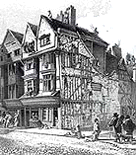 Лонг-лейн, Смитфилд. Чертеж дома из горючих материалов, построенного до Великого пожара
© Таким образом, к сентябрю 1666 года все, что требовалось, — это искра. Это было сделано в доме Томаса Фаринора, королевского пекаря на Пудинг-лейн, недалеко от Лондонского моста. В 2 часа ночи в воскресенье 2 сентября его рабочий почувствовал запах дыма и разбудил домочадцев. Семья бежала через близлежащие крыши, оставив только горничную, слишком напуганную, чтобы бежать, которая вскоре стала первой из четырех жертв пожара.
Лонг-лейн, Смитфилд. Чертеж дома из горючих материалов, построенного до Великого пожара
© Таким образом, к сентябрю 1666 года все, что требовалось, — это искра. Это было сделано в доме Томаса Фаринора, королевского пекаря на Пудинг-лейн, недалеко от Лондонского моста. В 2 часа ночи в воскресенье 2 сентября его рабочий почувствовал запах дыма и разбудил домочадцев. Семья бежала через близлежащие крыши, оставив только горничную, слишком напуганную, чтобы бежать, которая вскоре стала первой из четырех жертв пожара.
Деревянные дома разделяли лишь узкие улочки, и пожар быстро разгорелся, и уже через час мэр, сэр Томас Бладворт, был разбужен этой новостью. Он не был впечатлен, заявив, что «женщина может это разозлить». Однако к рассвету Лондонский мост горел: открытое пространство на мосту, разделяющее две группы зданий, выступило в качестве противопожарного барьера в 1632 году. Это произошло снова: сгорела только треть моста, спасая Саутварк от разрушения и ограничивая территорию огонь по лондонскому Сити, на северном берегу.
Сэмюэл Пепис жил поблизости и в воскресенье утром пошел к Лондонскому Тауэру. Там он увидел, как огонь летит на запад, раздуваемый ветром, и описал, как «голуби… парят над окнами и балконами, пока не сожгут свои крылья и не упадут». С неуверенностью Бладворта Пепис отправился в Уайтхолл, чтобы проинформировать короля и его брата Джеймса, герцога Йоркского, о ситуации. Хотя Карл II немедленно приказал Бладворту разрушить столько домов, сколько необходимо для сдерживания огня, первые попытки создать противопожарные барьеры были преодолены силой ветра, который позволил огню преодолеть промежутки даже в двадцати домах.К концу воскресенья огонь начал распространяться против ветра в сторону Башни, и Пепис начал собирать вещи.
К следующему рассвету огонь бушевал на севере и западе, и воцарилась паника. Герцог Йоркский взял под свой контроль усилия по остановке огня, вызвав ополченцев из соседних графств, чтобы помочь в борьбе и прекратить мародерство. Но пламя неумолимо продолжалось, пожирая Грейсчерч-стрит, Ломбард-стрит, Королевскую биржу и направляясь в богатый район Чипсайд.К середине дня дым был виден из Оксфорда, и лондонцы начали бежать на открытые пространства Мурфилдса и Финсбери-Хилл.
,Там, где ДЕЙСТВИТЕЛЬНО начался Великий лондонский пожар (и это НЕ Пудинг-Лейн)
Дневниковые записи, исторические записи и мемориальная доска на памятнике Великому пожару — все указывает на пламя в пекарне на Пудинг-лейн в 1666 году.
Однако удивительно, но с годами точное место, где началось возгорание, было забыто.
Теперь историк смог пометить его крестиком — в буквальном смысле — после того, как наткнулся на нарисованный от руки план 1679 года.
И это место находится не на Пудинг-лейн, а на мощеной улице напротив Полуостровный дом на улице Памятников.
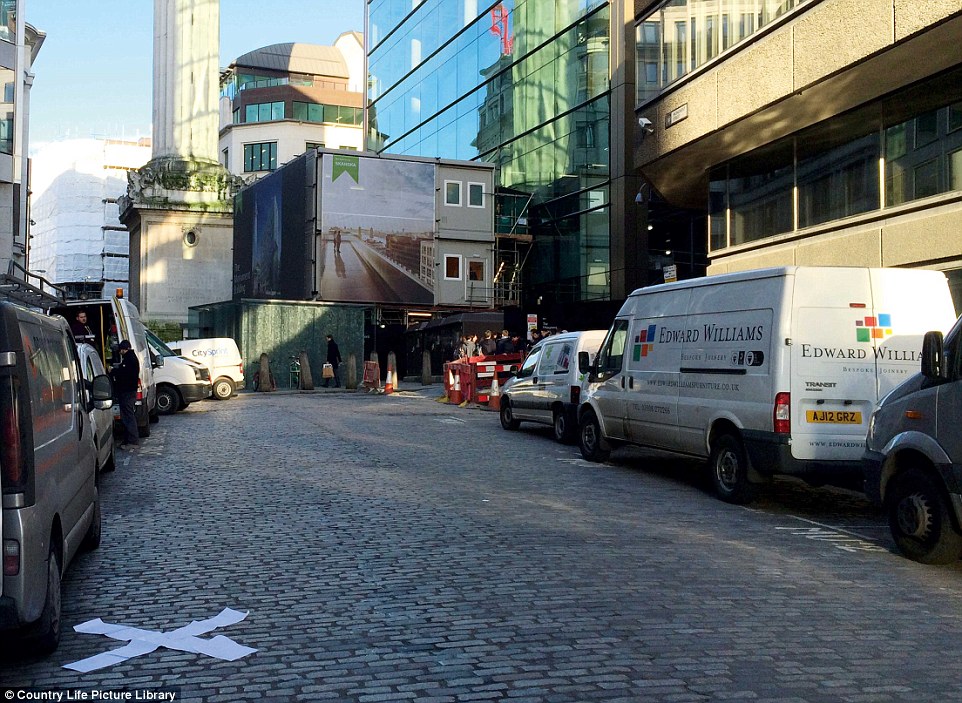

Дневниковые записи, исторические записи и мемориальная доска на памятнике Великому пожару — все указывает на пламя, возникшее в пекарне на Пудинг-лейн в 1666 году. Историк смог отметить точное местоположение крестиком (на фото) с использованием плана, нарисованного от руки 1679 года. Это место находится не на Пудинг-лейн, а на мощеной улице перед Peninsular House на Монумент-стрит
. Это место могло быть частью Пудинг-лейн во время пожара. но его границы были перемещены, когда была построена улица Монументов.
На нарисованном от руки плане изображен пустой L-образный участок, принадлежащий City Corporation, на восточной стороне Пудинг-лейн, а на одном участке написаны слова: «Мистер Фаринерс grounde (sic), там начинается Fyer (sic)». ‘ Это отсылка к пекарю Томасу Фаринеру.
Хорошо известно, что искры или тлеющие угли из его печи разожгли огонь, когда они зажгли кучу топлива.
В конце 19 века дом и его участок были разрушены при планировке улицы Памятников.
Но отличительная форма участка позволила определить его точное положение — с помощью плана 1886 года — до участка в пределах проезжей части новой улицы.
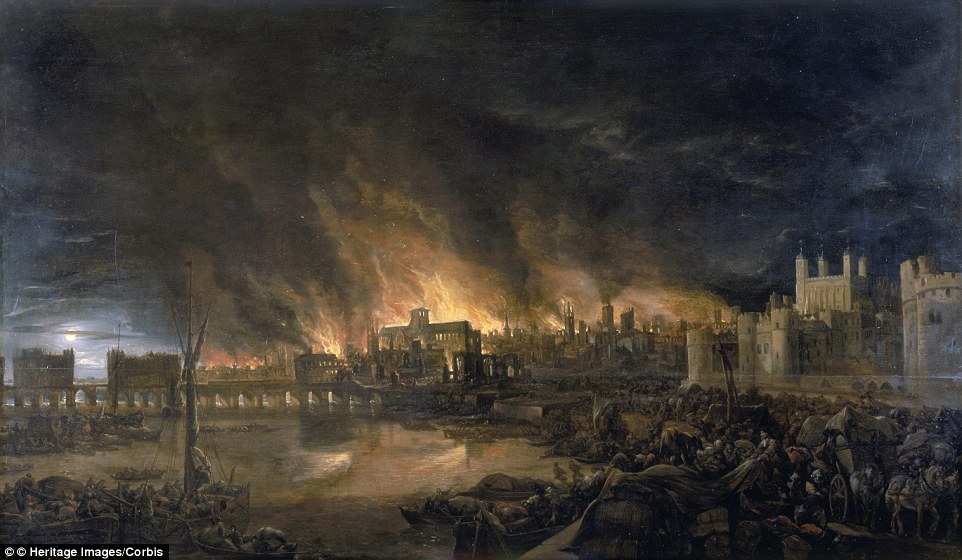

Великий лондонский пожар (на фото) считается одним из самых известных и разрушительных бедствий в истории Лондона. Он начался в час ночи в воскресенье 2 сентября 1666 года в пекарне Томаса Фаринера на Пудинг-лейн. Предполагается, что это было вызвано искрой из его печи, упавшей на кучу топлива поблизости
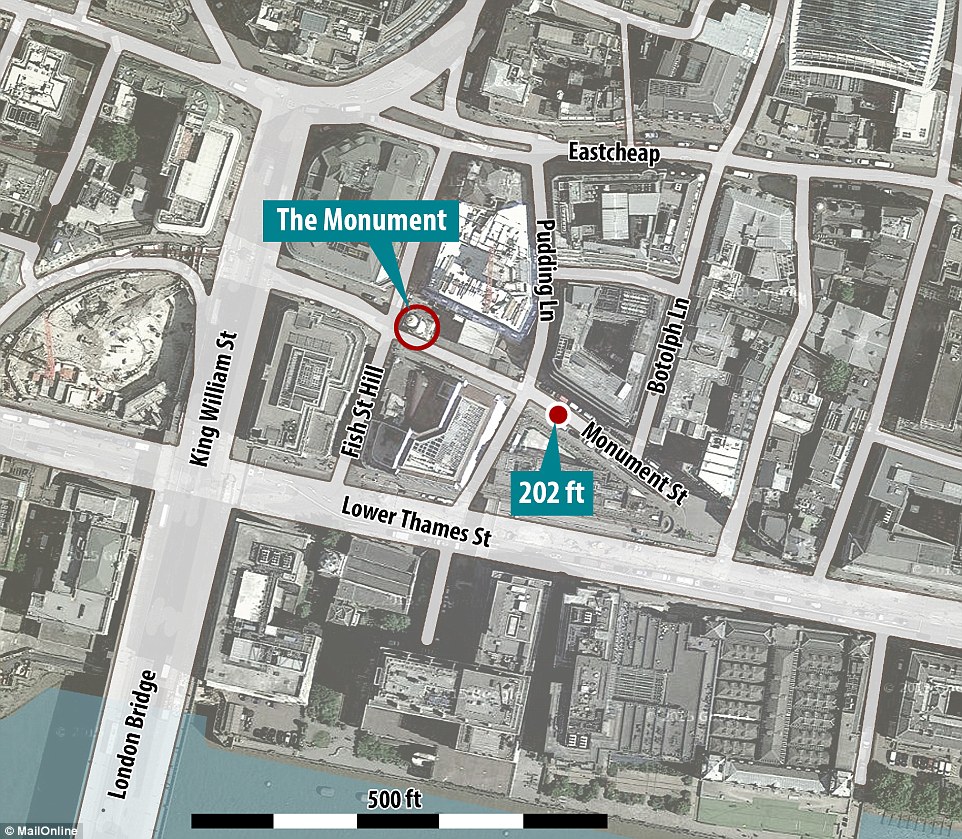

На этой карте показано расположение Пудинг-Лейн, Башни Монументов и места на Монумент-стрит, идентифицированного как место, где начался пожар. ,Это место могло быть частью Пудинг-лейн во время пожара, но его границы были перенесены, когда в конце 19-го века была построена Монумент-стрит.
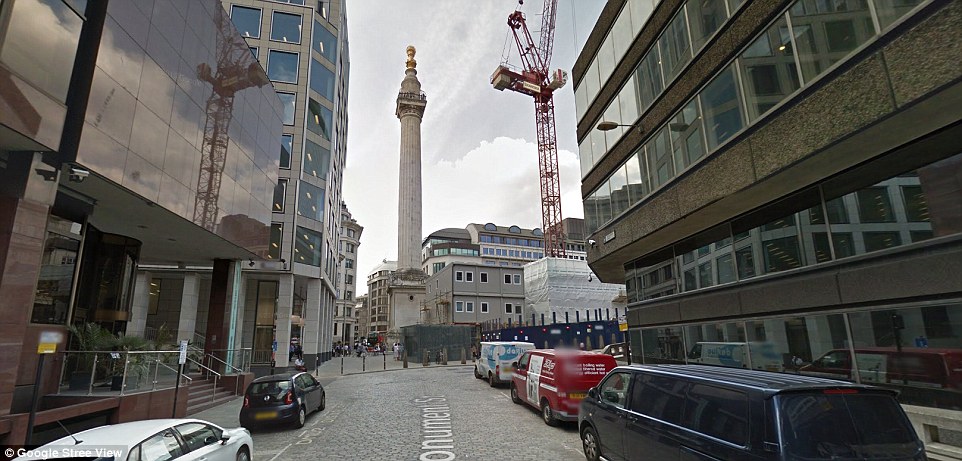

В конце 19-го века пекарня и ее участок были разрушены, когда монумент Улица (показана с места начала пожара) была разбита. Но отличительная форма участка позволила определить его точное положение до участка в пределах проезжей части новой улицы
ОПРЕДЕЛЕНИЕ МЕСТОПОЛОЖЕНИЯ
Историк Дориан Герхольд нашел это место, наткнувшись на нарисованный от руки план 1679 года.
На нарисованном от руки плане изображен пустой L-образный участок, принадлежащий City Corporation, на восточной стороне Пудинг-лейн, а на одном участке написаны слова: «Мистер Фаринерс grounde (sic), там начинается Fyer (sic)». ‘ Это отсылка к пекарю Томасу Фаринеру.
В конце 19 века дом и его участок были разрушены при планировке улицы Памятников.
Но отличительная форма участка позволила определить его точное положение — с помощью плана 1886 года — до участка в пределах проезжей части новой улицы.
Памятник, воздвигнутый в память о пожаре и построенный между 1671 и 1677 годами, дал последний ключ к определению точного местоположения на участке.
Надписи гласят, что пожар начался в 202 футах (61 метр) к востоку.
По кругу длиной 61 метр от Памятника вы попадете почти в конец основной части участка, то есть на роковую печь, стоявшую на том месте, которое сейчас является проезжей частью улицы Монументов.
Памятник, воздвигнутый в память о пожаре и построенный между 1671 и 1677 годами, дал последний ключ к определению точного местоположения на участке.
Надписи гласят, что пожар начался в 202 футах (61 метр) к востоку.
По кругу длиной 61 метр от Памятника вы попадете почти в конец основной части участка, то есть на роковую печь, стоявшую на том месте, которое сейчас является проезжей частью улицы Монументов.
Это не означает, что пожар не начался в пекарне на Пудинг-лейн в 1666 году, это означает, что когда планировка дороги была изменена, чтобы разместить Монумент и Монумент-стрит, ее границы были перемещены.
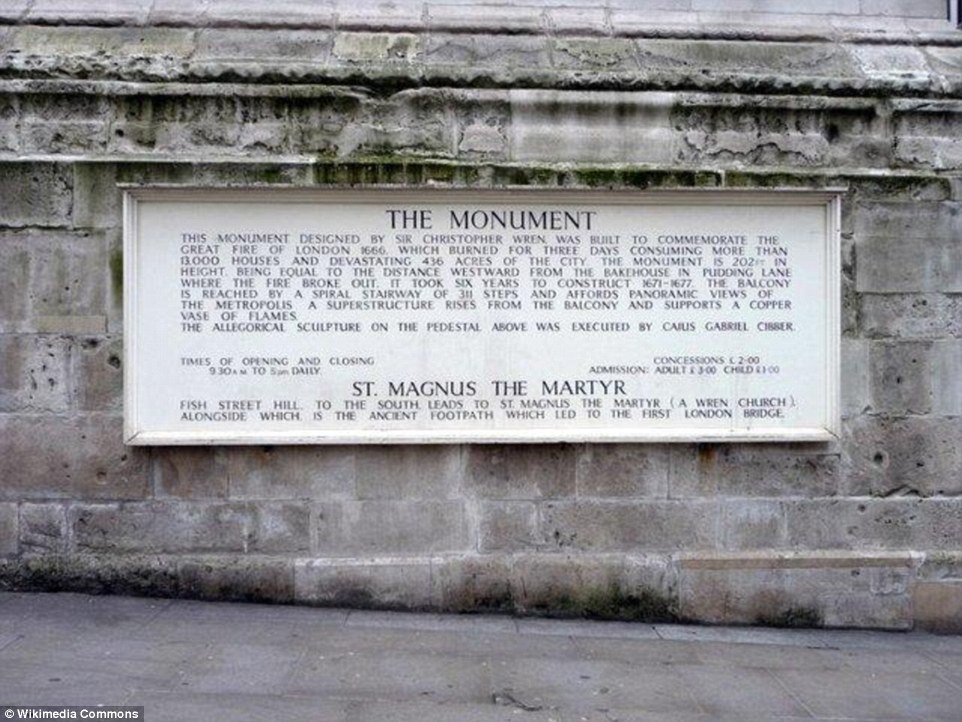

Памятник, воздвигнутый в память о пожаре и построенный между 1671 и 1677 годами, дал окончательный ключ к определению точного местоположения на участке. Надписи (на фото) говорят о том, что пожар начался в 202 футах (61 метр) к востоку. Проследив круг длиной 202 фута от памятника, вы попадете в недавно обнаруженное место
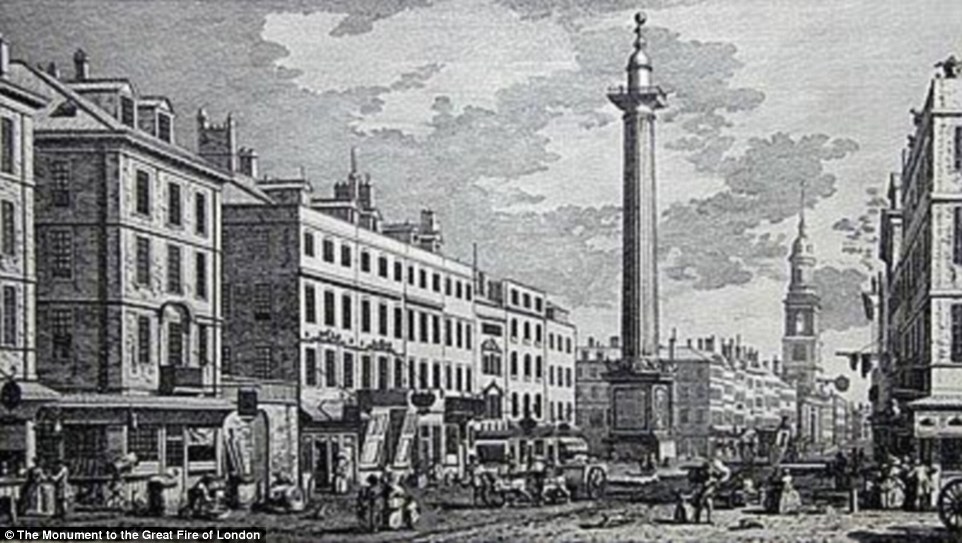

. Выводы не утверждают, что пожар не начался в пекарне на Пудинг-лейн в 1666 году, вместо этого они предполагают, что когда планировка дороги была изменена Чтобы разместить Монумент (проиллюстрированный здесь в 1794 году) и Монумент-стрит, границы Пудинг-Лейн были немного сдвинуты
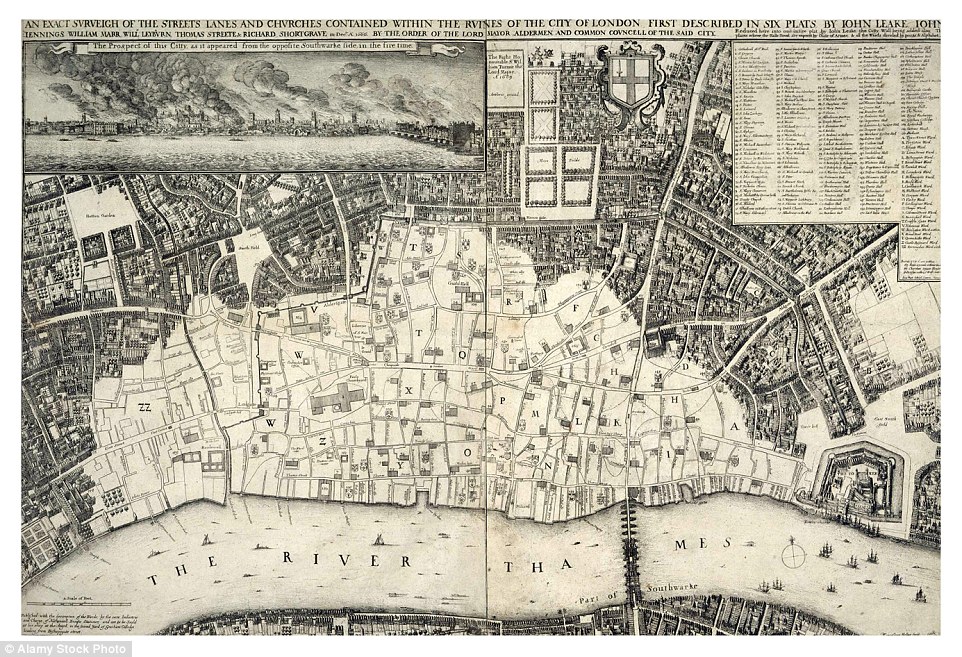

Историк Дориан Герхольд он нашел план в архивах City Corporation в Лондонском столичном архиве и определил место, где начался пожар 350 лет назад, 2 сентября.На этой карте показано, как Лондон выглядел во время пожара. Pudding Lane — это дорога, расположенная слева от буквы I в нижнем правом углу.


Прочтите полную статью в последнем выпуске журнала Country Life, уже в продаже
Историк Дориан Герхольд нашел план в Городская корпорация делает записи в Лондонском Метрополитен-архиве и выяснила место возникновения пожара 2 сентября 350 лет назад в последнем выпуске журнала Country Life, который выходит сегодня.
Он писал: «Удивительно, но знание того, где началось одно из величайших городских бедствий Великобритании, было утеряно.
«Памятный камень был установлен на этом месте в 1680 году, обвиняя католиков в пожаре, но он был удален примерно в 1750 году не из-за большей честности, а из-за того, что слишком много людей останавливались, чтобы посмотреть на него».
Вспомнив, как он нашел этот план, г-н Герхольд сказал Mail: «Он был среди бумаг комитета по недвижимости Лондонского Сити.
«Рукописный список бумаг был составлен несколько десятилетий назад, но никто, по-видимому, не взглянул на этот список и не осознал значение плана; Я не сам, когда впервые увидел это, так как предполагал, что это место уже было известно.
«Я наткнулся на это, изучая книгу о тысячах подробных планов зданий Лондона, нарисованных до 1720 года, многие из которых относятся к лондонскому Сити, в том числе один из домов, построенных на участке Пудинг-лейн в 1680 году».
Великий Лондон разрушил более 13 000 зданий и бушевал четыре дня.
Огонь распространился легко, потому что Лондон был «очень засушливым после долгого жаркого лета», а в районе Пудинг-лейн находились склады древесины, веревок и масла.Это сопровождалось сильным восточным ветром.
В своем дневнике Сэмюэл Пепис ярко описал, как это распространялось, отмечая, как воздух освещался «огненными каплями» или пучками горящей соломы и дерева, а небо было наполнено «ужаснейшим, злобным, кровавым пламенем, не похожим на прекрасное пламя обыкновенного огня ».
Подтвержденное число погибших составило всего шесть человек, но неизвестно, сколько человек умерло по косвенным причинам.
Г-н Фаринер и его семья сбежали из пекарни через окно наверху в соседний дом.
Француз по имени Роберт Юбер признался в разжигании Большого пожара и был повешен, но более поздние доказательства подтвердили, что в то время его не было в Лондоне.
В рамках восстановления власти решили воздвигнуть постоянный памятник Великому пожару недалеко от того места, где он начался.
Сэр Кристофер Рен, генеральный инспектор короля Карла II и архитектор собора Святого Павла, вместе с доктором Робертом Гуком разработали дизайн дорической колонны.
Они разработали план колонны с консольной каменной лестницей из 311 ступенек, ведущей на смотровую площадку.
Читайте полный текст статьи в свежем номере журнала Country Life, который уже в продаже.
РАЗРУШЕНИЕ ВЕЛИКОГО ПОЖАРА ЛОНДОНА
Великий лондонский пожар считается одним из самых известных и разрушительных бедствий в истории Лондона.
Это началось в час ночи воскресенья 2 сентября 1666 года в пекарне Томаса Фаринера на Пудинг-лейн. Считается, что это было вызвано искрой из его печи, упавшей на груду топлива поблизости.
Огонь распространился легко, потому что Лондон был «очень засушливым после долгого жаркого лета», а в районе Пудинг-лейн находились склады древесины, веревок и масла.Это сопровождалось сильным восточным ветром.
Пожар длился чуть менее пяти дней, но была разрушена треть Лондона, включая 13 200 домов, 87 церквей и собор Святого Павла.
В результате около 100 000 человек остались без крова, и архитекторам потребовалось 50 лет, чтобы восстановить город.
Француз по имени Роберт Юбер признался в разжигании Большого пожара и был повешен, но более поздние доказательства подтвердили, что в то время его не было в Лондоне.
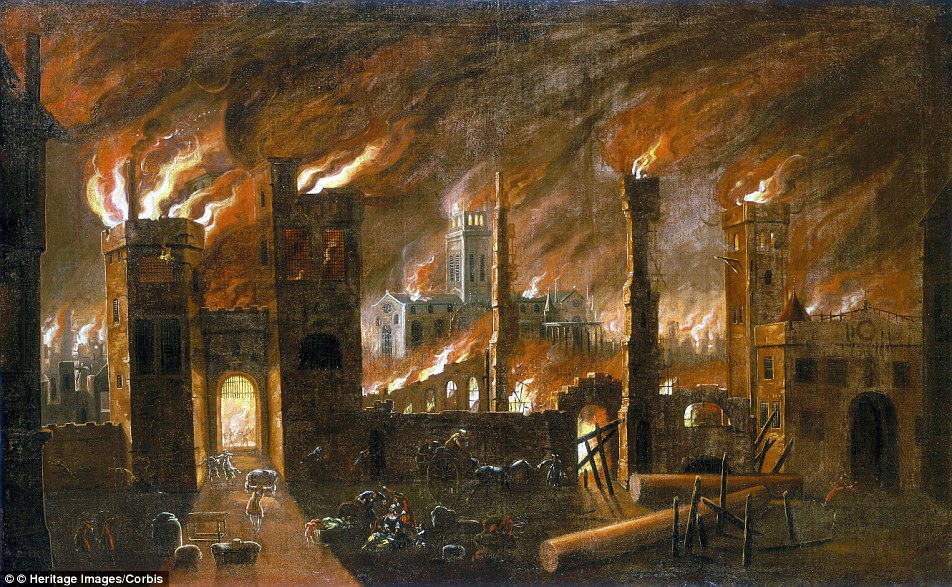

Пожар (на фото) длился чуть менее пяти дней, но была разрушена треть Лондона, включая 13 200 домов, 87 церквей и собор Святого Павла.В результате около 100 000 человек остались без крова, и архитекторам потребовалось 50 лет, чтобы восстановить город.
В рамках восстановления власти решили возвести постоянный памятник Великому пожару рядом с тем местом, где он начался.
Сэр Кристофер Рен, генеральный инспектор короля Карла II и архитектор собора Святого Павла, вместе с доктором Робертом Гуком разработали дизайн дорической колонны.
Они разработали план колонны с консольной каменной лестницей из 311 ступенек, ведущей на смотровую площадку.
Барабан и медная урна, из которой выходило пламя, были помещены наверху, что символизировало Великий огонь.
Монумент, как его стали называть, имеет высоту 202 фута (61 метр), чтобы отразить точное расстояние между колонной и тем местом на Пудинг-лейн, где начался пожар.
Мемориальная доска на памятнике гласит: «Памятник, спроектированный сэром Кристофером Реном, был построен в ознаменование Великого лондонского пожара 1666 года, который горел в течение трех дней, уничтожив более 13 000 домов и опустошив 436 акров города.
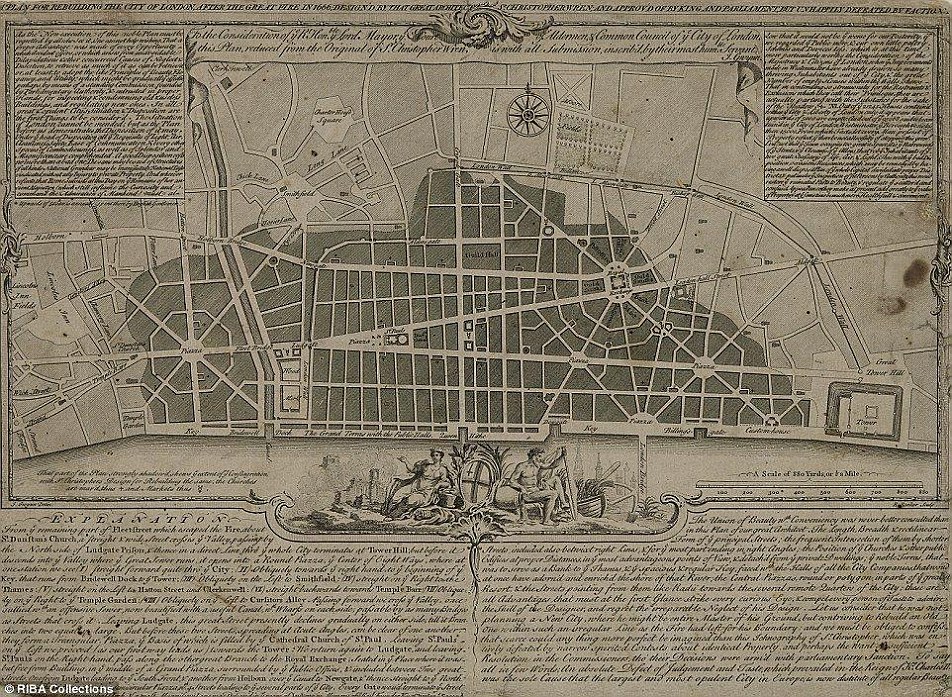

В рамках восстановления власти решили установить постоянный памятник Великому пожару недалеко от того места, где он начался. После Великого лондонского пожара король Карл II также призвал архитекторов выдвинуть планы восстановления города. Среди тех, кто должен был быть рассмотрен, был один, сделанный Кристофером Реном (на фото)
«Монумент 202 фута в высоту, что равно расстоянию к западу от пекарни на Пудинг-лейн, где вспыхнул пожар».
Колонна завершена в 1677 году.
В 1979 году археологи раскопали остатки сгоревшего магазина на Пудинг-лейн, недалеко от пекарни, где начался пожар.
В подвале они нашли обугленные остатки 20 бочек смолы (дегтя), вещества, которое легко горит и помогло бы распространить огонь.
Среди обгоревших предметов из магазина археологи нашли расплавленные куски глиняной посуды, свидетельствующие о том, что температура огня достигала 1700 градусов по Цельсию.
Источник: Лондонский музей
.Официальных грубых ошибок, массовой истерии и расистского насилия, угрожавших разорвать город на части
На другом берегу реки он может слышать треск, который издают дома, падая друг на друга. Пламя образует «одну целую арку огня», изгибаясь над городом, как большой лук и стрела шириной более мили.
Для пуританского священника Томаса Винсента, написанного годом позже, это лук, натянутый и зажженный Богом в наказание за грехи Лондона. Английская революция послужила катализатором кратковременного возрождения судьбы, пророчеств и нонкомформистского мистицизма.Многие предсказывали пожар. Итак, для Винсента Лондон — новый Содом:
«Но вечер приближается, и теперь огонь виднее и страшнее! Вместо черных занавесей ночи, которые раньше были покрыты городом, теперь занавески желтые! Дым, поднимавшийся от горящих частей, казался ночным пламенем, которое, раздуваясь ветром на другие части, казалось, будто весь город на некотором расстоянии горел! Теперь надежды начинают угасать, и всеобщий ужас охватывает души людей.Этой ночью в Лондоне мало спят; изумление, которое глаза и ухо воздействуют на дух, либо иссякает, либо прогоняет сон, который раньше сковывал чувства. Одни работают, чтобы погасить огонь водой, другие пытаются остановить его, снося дома; но все без толку. Если огонь немного погасить, или потушить, или остановить в некоторых местах — это очень мало времени; он быстро набирает и восстанавливает свои силы; она прыгает и взбирается вверх и делает наступление еще более яростным! Он оттесняет своих противников, выхватывает их оружие из их рук, захватывает водохранилища и машины, сжигает их, портит их и делает непригодными для службы.
«Некоторые стоят на коленях ночью, проливая слезы перед Господом, ходатайствуя за бедный Лондон в день его бедствия; но, увы, я боюсь, что у престола благодати было слишком мало плачущих Иеремий, слишком мало умоляющих Моисея встать в пропасть; слишком мало борющихся Джейкобса, чтобы бороться с Господом, и висеть на его руке. Грехи Лондона были слишком велики, а гнев Бога на город был слишком горячим, чтобы его можно было легко и быстро утолить и смягчить. И если заступничеством некоторых будет получено смягчение, так что Господь не возбудит весь Свой гнев, чтобы полностью разрушить это место, как Он сделал Содом и Гоморру; тем не менее, никто не может заставить себя призвать этот гнев и отменить указ, изданный против города! Пришло время падения Лондона; огонь получил поручение от Бога сжечь город — и поэтому все попытки помешать ему тщетны! »
Пепис плачет или говорит, что плачет, и идет домой «с грустным сердцем» — только для того, чтобы найти теперь бездомного друга, ищущего убежище с большим багажом.
,Великая лондонская чума | эпидемия, Лондон, Англия, Соединенное Королевство [1665–1666]
Великая лондонская чума , эпидемия чумы, опустошавшая Лондон, Англия, с 1665 по 1666 год. Городские записи показывают, что во время эпидемии умерло около 68 596 человек, хотя Предполагается, что фактическое число смертей превысило 100 000 из общей численности населения, оцениваемой в 460 000 человек. Вспышка была вызвана Yersinia pestis , бактерией, связанной с другими вспышками чумы до и после Великой лондонской чумы.
Британская викторина
Исследование истории: кто, что, где и когда?
Кто был основателем Пакистана?
Великая чума не была единичным событием — 40 000 лондонцев умерло от чумы в 1625 году, — но это была последняя и самая страшная из эпидемий. Все началось в пригороде Лондона Св.Джайлз-ин-зе-Филдс, и самые большие разрушения оставались на окраинах города, в Степни, Шордиче, Клеркенуэлле, Крипплгейте и Вестминстере, кварталах, где было тесно у бедняков. Вспышка подозревалась зимой 1664 года, но она не распространилась интенсивно до весны 1665 года. Король Карл II и его двор бежали из Лондона в начале лета и не вернулись до следующего февраля; Парламент провел короткое заседание в Оксфорде.
В декабре 1665 года уровень смертности внезапно снизился и продолжал снижаться всю зиму до начала 1666 года, при этом в том году было зарегистрировано относительно небольшое количество смертей.Из Лондона болезнь широко распространилась по стране, но с 1667 г. эпидемии чумы не было ни в одной части Англии, хотя спорадические случаи отмечались в счетах смертности до 1679 г. Исчезновение чумы в Лондоне приписывалось Великому Пожар в Лондоне в сентябре 1666 года, но он утих и в других городах без такой причины. Это снижение также приписывают карантину, но эффективный карантин фактически не был установлен до 1720 года. Ученые в целом согласны с тем, что прекращение чумы в Англии было спонтанным.
.
Leave A Comment